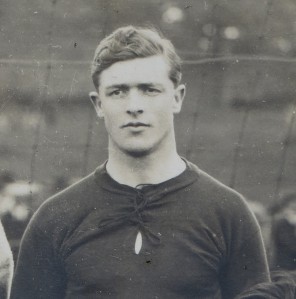April 1918 was very definitely the cruellest month of the entire war for this collection of Cotswold villages. Nine men died, the highest number for any month, and bad news was beginning to filter through to waiting families as May progressed. In addition to reporting the deaths of Richard Raymond-Barker and Terrence Dean, the local papers expressed anxiety about the fate of Frank Webb, whose family owned Sevilles Mill, towards the end of the High Street. Normally a reliable and frequent writer of letters to his wife Lily, she had not heard from him for some time, and friends had contacted her to say he was missing.

Frank had initially been turned down when he tried to enlist, because of his poor eyesight. He continued his village life, managing the bone mill, attending the Baptist church, playing the violin and flute, joining in games of cricket, and carrying out duties in the VTC. Come 1917 and a crisis of manpower, however, his eyesight was judged ‘good enough to shoot Germans’, and off he went to do his duty, enlisting with the Glosters. He returned home to see his family for what would be the last time, on pre-embarkation leave in October 1917.
His widow and two daughters (a little son, Harry, had died of septicaemia in August 1914) had to wait more than twelve agonising months for confirmation of his death, which didn’t come till June 1919. His official date of death was 4th April, but he may have died even earlier, at the end of March. He was 34.

The tribute to him published in June 1919 enumerated his numerous contributions to community life, including:
…good work in connection with the Liberal Registration Committee… a great help to Mr H Smart in temperance work, being a life-long abstainer…member of the Tabernacle Choir, violinist in the string band…a welcome reciter.
(Stroud Journal)
He had also served as chairman of the Stroud Mutual Provident Sick Benefit Society District Committee.
The death had also been announced of Frederick Boulton, only son of Mr and Mrs J Boulton of Snake’s Hole, Middle Lypiatt, who had been fatally wounded on 18th April near Bethune, and died the following day. He was only just 19, and had only just arrived in France.
In happier news, Roy Essex, son of the headmaster of Christ Church School, had been promoted to lieutenant (‘given his 3rd pip’, as the jaunty ‘With the Colours’ column in the News put it). A month later, the paper recorded how he had been awarded the MC for:
Conspicuous service on the Somme and Lys…Practically continuous fighting since March 21st, however, has had the inevitable result, and he is now taking enforced rest. He shares the optimistic feeling that ‘old Fritz is cutting his own throat and much is just letting him do it’.
Harold Hale, whose family lived at Randall’s Green, had joined the Royal Flying Corps as a fitter in 1917. He had been stationed in Ayr:
While up there he was starting a propellor, which, however, was a bit previous, and knocked him down and about. Anyway it put him in hospital for some weeks, but he is now looking especially well. He has had eighteen months of the Air Force, and likes it…
Lionel Griffin, son of Mr J J Griffin of Cotswold View, Chalford Hill, was home on leave, he ‘arrived in the district from a convalescent camp in this country on Friday. He is in the Artillery, and has seen much service in France’.
The Australian airmen stationed at the Aerodrome had been whiling away their leisure hours preparing a show – beguilingly entitled ‘While the Billy Boils’. The first performance was held at the Sub Rooms on Wednesday 5th June: ‘Australian Artists, Music, Scenery’ were promised. To read the review of the show in the Stroud Journal is to be transported back to a stifling evening in the company of an excitable and expectant crowd:
From far and near came troops of the fair sex to listen and admire…A Camp Scene in Australia was presented to the party…and in the semi-tropical atmosphere of the room it was not difficult to be transported in fancy to ‘the land of the sun’…The scene was made as realistic as possible by the skilful brush of one of the company…and the audience was introduced to the habits of life and conversation in the Australian Bush…while the songs were presented in an unconventional manner, the character of the music was uniformly high…There was not a dull moment throughout the evening. (7-6-18)
Proceeds went to charity: the Belgravia Supply Depot and the Red Cross. The entertainment proved so popular, it was repeated on the 8th June!
A report on Food Provision in the same Journal observes that ‘provision of men for the fighting lines is the supreme task of the moment’, which has resulted in a severe shortage of agricultural labourers. Prisoners have been used, but:
Women have not only filled the gap, but it is largely due to their services that the agricultural returns this year are likely to beat all records. Greybeards and schoolboys have helped, but it is mainly the 300,000 women who are working on the land in England and Wales who have saved the situation. With experience their services will become still more useful…In little more than a year agriculture has been restored to the position it occupied forty or fifty years ago, and it has made the United Kingdom all but self-supporting as regards the two staple foods, bread and meat…
The importance of allotments was also emphasised.


